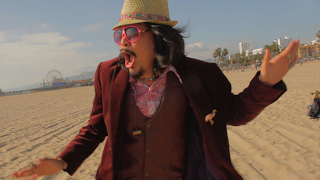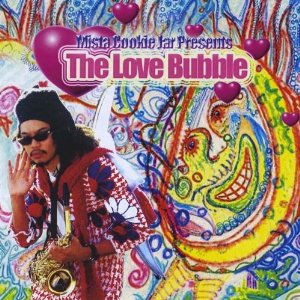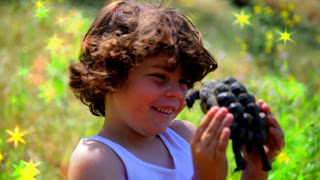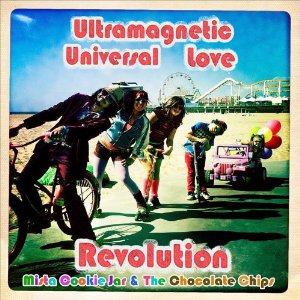One of the first interviews I ever conducted for this site was with Justin Roberts (that's him in the middle, surrounded by his Not Ready For Naptime Players). And while I like to think I've had a good 7+ years in the meantime, Roberts' has been even better. Four albums later, including the Grammy-nominated Jungle Gym and Roberts' most recent album, 2013's Recess, Roberts' career is stronger than ever, a kindie superstar respected by his fellow musicians and adored by his many fans.
So even though I've had a handful of conversations with him since then, I was looking forward to talking with him not only about his most recent album but also about making a career out of his music. Roberts chatted by phone with me last week about food, emotions, and music-making, and what might come next.
Zooglobble: I usually start off my interviews with what your musical memories are from growing up, but I want to mix it up a bit and ask you what your favorite food memories are?
Justin Roberts: That's pretty much what touring is for us -- figuring out where we're going to eat...
I think my favorite food memory is more nostalgic. It's from Michigan, where my grandmother lived from the age of 15 to 95. We were touring up there, and some relatives offered us the use of a lake house to stay. We went to a nearby restaurant there called the Sandpiper and the moment I stepped inside, I remembered it instantly. One of those classic restaurants that feels like it's out of another time.
We were three people out of place in this restaurant, and the waitress talked with us about how we got there. I said that this was my grandmother's home and when I mentioned her name, the waitress teared up, knew exactly who she was.
How do you go about finding food when you're on the road?
Checking Yelp, asking folks. Once we played in Lafayatte [Louisiana], and someone recommended a restaurant in Breaux Bridge, with lemon ice box pie. Now, I'm not a pie fan, but I ate that, and thought, "Oh, this is why people like pie."
I remember Liam [Davis] and I were doing a lot of library shows in New York once. We would accost the librarians to get suggestions. This was on Long Island, near Marathon, Suffolk County, so it tended toward Italian. One place they recommended was Steve's Piccola Bussola. We'll go out of our way for that.
We want to find local places -- there's a lot of tediousness to traveling, so finding a place that feels like home goes a long way.
It's been more than fifteen years since the release of Great Big Sun; you've probably been playing for kids for more than twenty years, right?
Yes, it was 1992 and I'd moved to Minneapolis to play with my band, Pimentos for Gus. My first job as a preschool teacher, I told 'em I was a musician, so they asked me to play. At first, I did stuff like "Twinkle Twinkle Little Star," but I got bored with that. I was a big Van Morrison fan, so brought that in.
The first song of mine was "Giraffe/Nightingale," which I loved played for kids. I thought it was sort of a boring song -- there's not a chorus, it isn't fast, but I remember going to the open house, and the 4-year-olds sang it by themselves.
We were studying apples, so I wrote "Apple Tree." I was not even remotely thinking about [a career in kids music], but it felt really natural. I kept writing kids' songs even after leaving the preschool job. I really recorded Great Big Sun for myself.
So more than fifteen years after that, how do you challenge yourself?
As early as Not Naptime, I was thinking, "what else can I possibly write about?"
For me, the biggest change was that as the band began to develop, that caused other changes. On Way Out, the presence of a drummer, of trumpet in writing changed things.
Technology, too -- it's easier to record yourself now. To some extent with Meltdown!, and definitely beyond that, I write at the computer. I'll create a poorly programmed drumbeat and bass [with guitar] -- keyboard and piano are more of a mystery to me. The vocals will be layered. It made it exciting to write.
With Lullaby, it was a bit of a switch -- how do you keep in interest with the tempo slow? The idea for "Polar Bear" I'd had many years before, but didn't do anything with it. So I thought that instead of guitar, what if it were a cello?
You wouldn't have thought of that fifteen years ago...
Definitely.
I like bridges -- a lot of bridges on Recess are keyboards, which, like I said, are more of a mystery to me. As a result, the songs went in a different direction. I've been doing some in-stores recently, and find I can't do some of them by myself. [Laughs]
Regarding challenges... the song "Otis" came out of an interest in writing a song about elevators. It's actually become a fan favorite, but when I started, I thought, "how can you write a song that won't be boring?" Then [drummer] Gerald [Dowd] mentioned the Otis Company, and I thought that was the hook. Then I added in how the 13th floor is often missing, and I had this vision of heading downtown.
Some of the underlying themes... the underlying emotions are important. With Recess, there are lots of songs about freedom, so you step outside the situation and think about how that applies.
You know, I've written exactly one kids' song, and that was for puppets, so emotional underpinning isn't my strength. But more than any other kids' artist, your songs tap into some deep emotional well inside me. As a songwriter, how do you tap into those emotions?
It's a little mysterious -- I'm tapping into some deep-seated emotions inside myself. The story tells itself in some manner. Like on "School's Out," there's that feeling of love. The boy says "don't want to make you cry," even though this will be gone. That has resonance. The subjects they're studying, at first, they were just details I filled in at the beginning of the song -- knights in armor, math, and outer space, all standing tall. But at the end, they mean something more. Stuff comes out and it's emotionally resonant.
With "Trick or Treat," of course, I had to write a Halloween song, but don't care really about the holiday. I had this memory of my brother sorting out candy, which became the line "put every piece in alphabetical order." Or the "sky halfway dark," reflecting the passing of fall. It's a fun rock song, but it's emotionally resonant to me. It makes that connection for me. When I hear others' reactions, I think, "Oh, good, that worked for me, but not just me."
It can be any other art -- the connections they make is why I keep songwriting.
I also wanted to say how I much I liked the comment you made in the Recess review about "Redbird" and the journey from freedom to unconditional love. Because when I wrote the song, I wondered, does this make any sense on the album? Did it feel right? When I read your comment, I saw that it did.
Besides the emotional connection, you use dedications more than other musicians. Some are pretty obvious, like the song about a dog ("Every Little Step") is dedicated to, well, your dog, but others?
Sometimes they're very specific. Like on "Sandcastle" [from Meltdown!] I wrote it thinking about a friend (an adult) who'd recently lost his mother. I also dedicated "Doctor Doctor" [Way Out] to her, she was a doctor and also a friend to me. It's a song about a kid scared getting shots. I also remembered how I felt when I'd been bit by a chipmunk and had to get shots.
Sometimes they're a bit of an afterthought. On "Wild Ones" [from Lullaby]... I'd always had a connection with Pierre by Maurice Sendak. Sendak died while I was working on that song, so it was a bit of a tribute to him. I just remembered the joy of reading in bed... Have you seen the documentary Spike Jonze did on him [Tell Them Anything you Want] while filming Where the Wild Things Are?
I haven't, actually.
You should. He was such a curmudgeon, his only friends are his dogs. He says, "I didn't choose to write children's books -- this is just what I do."
There's something about kids' metaphors for grief about a friend's mother dying, or memories. Something about that is emotionally resonant. I love the connection it creates with families.
I'm getting a lots of notes from families with school starting saying they're playing "Giant Sized Butterflies." I make a connection with myself, but some is so much of a surprise to me -- after the fact, I say, "Oh, wow."
So how are you going to challenge yourself in the future?
I've got a couple different ideas. One is I've talked with a couple theatres about writing a musical, writing new songs.
I've long thought that Fountains of Wayne songs would make a great musical.
Yeah... you know, Robbie Fulks has been playing these shows on Monday night and he played "Prom Theme" -- that sort of aching nostalgia is like the high school version of what I'm trying to do, like the Beach Boys songs about the end of summer heartbreak.
And then for the longest time, I've wanted to do an album of Craig Wright songs. A few years ago, I recorded him singing some unreleased songs of his. He's one of my favorite songwriters. Maybe after all this work for Lullaby and Recess I'll just book some studio time and record it.
And you're working on a couple books -- are they finished?
For one book the artwork is almost finished. It's by a great illustrator called Christian Robinson -- it'll be out a year from now. (The other book has a story.) It's taken awhile, but I've made some changes. I've done it twice, and it's gotten better. It's in rhyming verse and features a character in "Billy the Bully," Sally McCabe, and tells the story from her perspective.
Photo credit: Todd Rosenberg
























